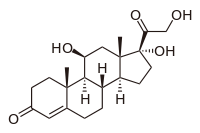
Photo from wikipedia
Background & Aim Mesenchymal stromal cells (MSC) have been approved for use in Crohn's fistula and paediatric acute GvHD and have been tested in clinical trials for organ transplantation. Patients… Click to show full abstract
Background & Aim Mesenchymal stromal cells (MSC) have been approved for use in Crohn's fistula and paediatric acute GvHD and have been tested in clinical trials for organ transplantation. Patients with these inflammatory conditions are often treated with immunosuppressive drugs, however we do not fully understand how MSC and immunosuppressive drugs interact and whether or not they have complimentary or inhibitory effects on each other. MSC require cytokine activation to facilitate their immunosuppressive function. The existing literature regarding approaches that use MSC and cyclosporine A (CsA) are conflicting regarding the effect of CsA on MSC potency and function. This study sought to further understand the interactions between MSC and the commonly used calcineurin inhibitor CsA. Methods, Results & Conclusion Here we clearly demonstrate that CsA added at the same time as MSC negatively effects MSC suppression of T cell proliferation. However, licensing MSC with IFN-gamma before addition of CsA protects MSC from this negative effect of CsA. Notably, adding CsA to MSC after IFN-gamma pre-stimulation enhances MSC production of IDO. Mechanistically, CsA reduces SOCS1 expression facilitating enhanced IDO production in IFN-gamma pre-stimulated MSC. Importantly, CsA exposure to IFN-gamma pre-stimulated MSC before administration, significantly enhanced the potency of MSC in a human relevant humanised mouse model of acute graft versus host disease.
Journal Title: Cytotherapy
Year Published: 2020
Link to full text (if available)
Share on Social Media: Sign Up to like & get
recommendations!